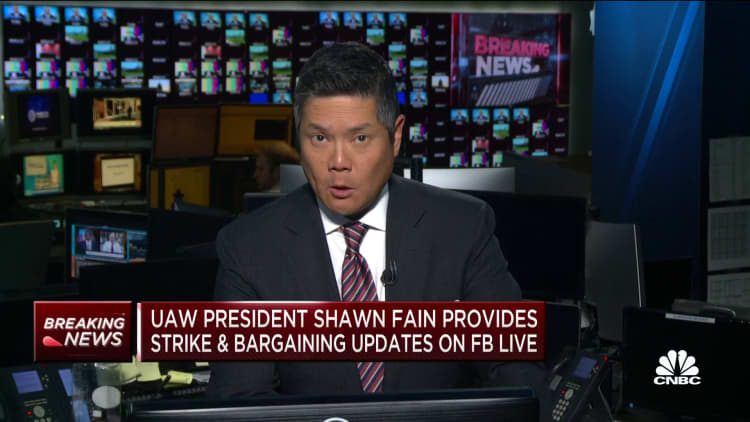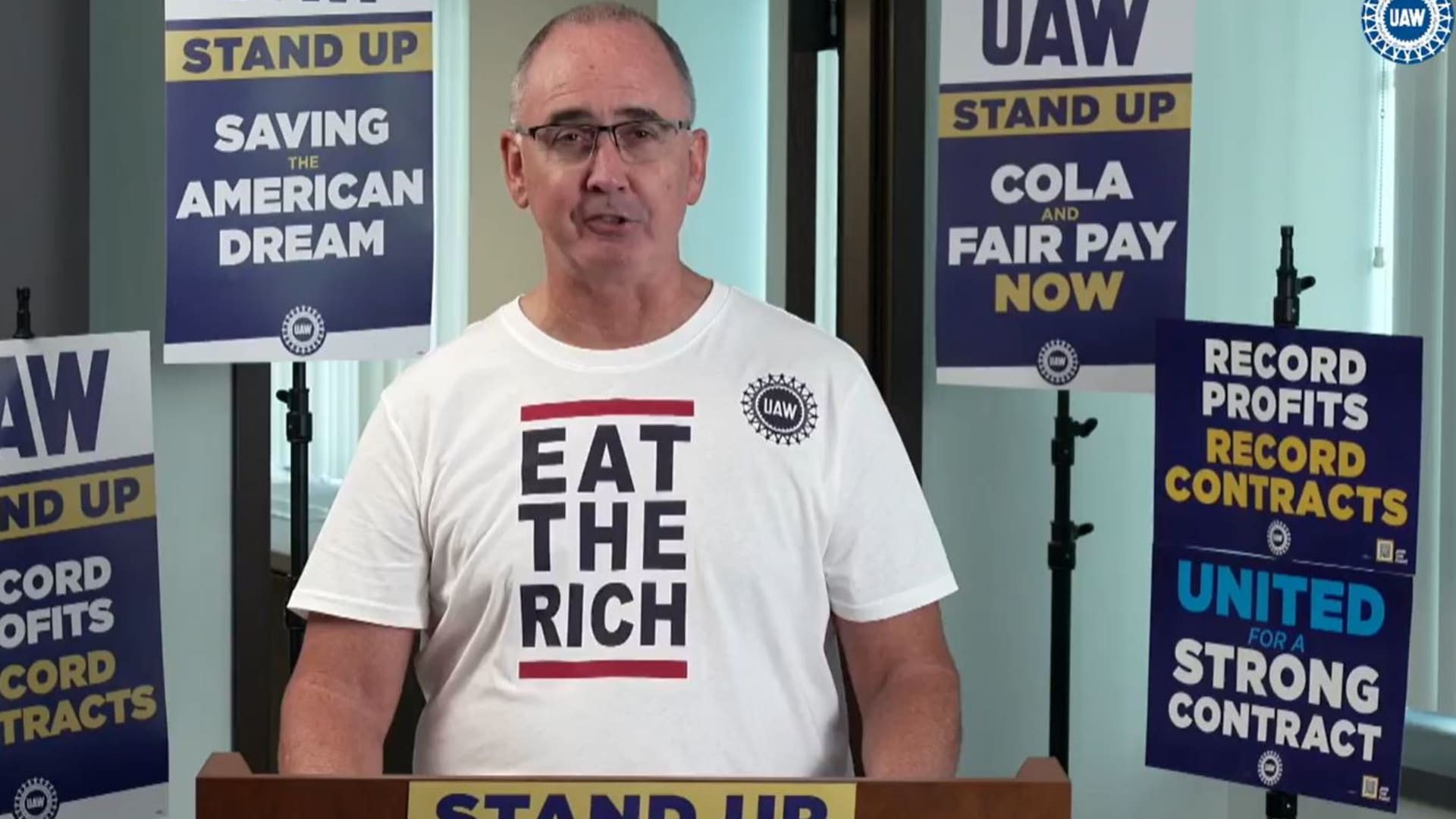UAW President Shawn Fain provided an update on negotiations with the Detroit automakers during an online broadcast on October 6, 2023.
Screenshot
DETROIT – Amid positive developments in the negotiations, including General Motors agreeing to include battery cell workers in its national agreement, the United Auto Workers (UAW) has decided not to expand strikes against the Detroit automakers this week. This is a departure from the targeted strikes that have been taking place since September 15 at GM, Ford Motor, and Stellantis.
In a recent announcement, UAW President Shawn Fain revealed that the union was planning to shut down GM’s Arlington Assembly plant, which produces highly profitable full-size SUVs. However, GM’s last-minute proposal to include battery cell workers in its national agreement prompted the UAW to reconsider. Fain described this development as a “transformative win” and emphasized the significance of this decision for the union’s membership.
While GM did not immediately comment on the matter, citing ongoing negotiations, the automaker expressed its commitment to reaching an agreement that benefits its employees and ensures its future success.
It’s worth noting that GM is the only Detroit automaker with a joint venture battery plant that is both operational and unionized in the U.S. The company has also announced plans for additional battery cell plants in collaboration with LG Energy Solution and Samsung SDI.
Battery plants
GM’s decision to include battery cell workers in its national agreement puts pressure on its crosstown rivals, Ford and Stellantis, to follow suit. The UAW typically uses agreements between the automakers as a model to ensure “equal pay for equal work” for its members.
Fain highlighted the importance of this development, stating that GM’s plan to replace engine and transmission plants with low-wage battery jobs has been countered by the UAW’s alternative plan, which has proven successful at GM and is expected to achieve similar results at Ford and Stellantis.

The negotiations between the UAW and the Detroit automakers have been particularly contentious due to disagreements regarding electric vehicle (EV) battery plants. The union believes that the joint ventures formed by the automakers with battery makers to produce EV batteries in the United States are an attempt to exclude the UAW from these new facilities.
The automakers argue that the battery plants, as joint ventures, are not covered by their agreements with the union and should not be a factor in contract negotiations.
However, the UAW has made it a priority to ensure a “just transition” for its members as the industry shifts towards electric vehicles. This focus on protecting its members has caused frustration among the automakers. Ford CEO Jim Farley recently accused the UAW of “holding the deal hostage over battery plants.”
Despite these challenges, Fain expressed optimism about the progress made in the negotiations, emphasizing that the union has achieved more than expected in just three weeks.
‘Significant progress’
The UAW has been gradually increasing the strikes since September 15 in response to the failure to reach tentative agreements. Instead of national walkouts, the union has opted for targeted strikes at specific plants.
Fain acknowledged that while a tentative agreement has not been reached yet, significant progress has been made. Ford has offered a 23% raise over the expected four and a half year contract, while GM and Stellantis are at around 20%. Additionally, both Stellantis and Ford have agreed to reinstate a cost-of-living adjustment that the union lost over a decade ago. Mark Stewart, Stellantis North America’s Chief Operating Officer, expressed optimism about the ongoing discussions, but acknowledged that there are still gaps that need to be addressed.
United Auto Workers (UAW) members from the General Motors Lansing Delta Plant picketing in Delta Township, Michigan on September 29, 2023.
Rebecca Cook | Reuters
Currently, only 17% of UAW members covered by the expired contracts with the Detroit automakers are on strike, amounting to 25,200 workers. Fain had previously indicated that the union would increase the work stoppages based on progress in the negotiations.
The strikes began at assembly plants for each of the automakers and then expanded to parts and distribution centers. In the recent week, the strikes were further expanded to GM’s assembly plants in mid-Michigan and Ford’s plant in Illinois.
Fain emphasized the careful escalation of the union’s strategy and highlighted the impact of the strikes on vehicle production for the Detroit automakers. Several models, including Ford’s Ranger and Bronco, GM’s pickups and SUVs, and Stellantis’ Jeep and Gladiator, have been affected by the strikes.
According to GM, the strikes have cost the company $200 million in lost production during the third quarter.
Counter proposals have been exchanged between the UAW and each of the automakers in the past week, indicating ongoing progress in the negotiations.
Denial of responsibility! Vigour Times is an automatic aggregator of Global media. In each content, the hyperlink to the primary source is specified. All trademarks belong to their rightful owners, and all materials to their authors. For any complaint, please reach us at – [email protected]. We will take necessary action within 24 hours.


